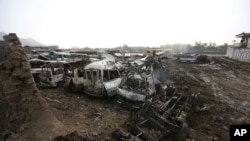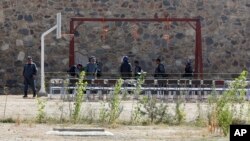Pakistan says it is “sincerely” making efforts to reach a negotiated end to the conflict in Afghanistan because doing so would address Islamabad’s own security concerns and encourage millions of Afghan refugees and migrants who have lived in Pakistan for decades to return to their country.
National Security Adviser Nasir Janjua made the remarks Tuesday, a day before senior Afghan, Pakistani, Chinese and American diplomats are scheduled to meet in Islamabad to explore ways to start peace talks between the Kabul government and the Taliban.
It will be the fifth meeting this year for the parties, known as the Quadrilateral Coordination Group, or QCG.
The four-nation group earlier finalized a road map to peace but has not persuaded the Taliban to join talks with the Afghan government.
Deep differences remain between Kabul and Islamabad on how to push the Taliban to the negotiating table.
“These are trying times, challenging times. We are passing through it together. We have some differences, differences in our outlook. We are very sincerely trying to help out [in] the reconciliation. We are trying to play our role in bringing peace to Afghanistan and also to our restive areas. I am sure together we have a shared future,” Janjua said.
The lack of progress on peace talks plus increased Taliban attacks are fueling tensions between Afghanistan and Pakistan, where insurgent commanders are allegedly sheltering.
Waiting for a decision
Afghan President Ashraf Ghani repeated his demand last week that the time has come for Islamabad to deliver on its commitments.
“All four (QCG) states committed to a road map and their obligations, particularly by the state of Pakistan. Those obligations are that if Taliban groups prove irreconcilable then there will be use of force. We are waiting for that decision,” Ghani said.
Pakistani officials insist military action would require consensus among all QCG members and in Wednesday’s talks, their delegation will re-emphasize the need to give the reconciliation process “a fair chance and more time."
In background discussions, officials have told VOA they do not believe the process has come to the point where the Taliban should be declared “irreconcilable” and be dealt with militarily.
Bilateral relations deteriorated after last month’s Taliban suicide bomb-and-gun attack at the Afghan intelligence compound in Kabul in which nearly 70 people were killed and hundreds more wounded.
Afghan authorities blamed the Pakistan-based militant Haqqani network, which is fighting alongside the Taliban, for plotting the bloodshed.
Officials in Islamabad reject the charges as “politically motivated” and an attempt to divert attention from “growing internal problems” facing President Ghani’s national unity government.
Since the deadly April 19 attack, six Taliban prisoners convicted of terrorism have been executed on Ghani’s order and he has instructed security forces to intensify counterinsurgency operations across Afghanistan.
Rejecting ‘vengeance mode’
Pakistani officials say if they follow suit and use force against the Taliban insurgents on Pakistani soil, the country will lose ground in pushing the insurgents to the table for talks. They say the country cannot go into "vengeance mode" the way Afghanistan has done in response to one suicide attack.
The hardening of Kabul's stance, critics say, has further reduced chances for arranging reconciliation talks with the Islamist insurgency.
“We mean to serve the purpose we want to bring them (the Taliban) to the table. We are making our efforts,” a senior Pakistani official dealing with matters related to national security told VOA.
The absence of incentives for the Taliban to engage in peace talks, along with prevailing skepticism in Kabul about the future of Ghani’s government, have all made it extremely difficult for Pakistan to persuade the insurgent group to come to the talks, the official said.
Analysts say that differences among Taliban leaders on whether to engage in talks with Kabul are also hampering efforts to bring the insurgent group to the table. They believe new Taliban leader Mullah Akhtar Mansoor has opted for intensifying the insurgency instead to avoid fragmentation within the group.
“The Taliban will be willing to sit down to talk when it has an incentive and it simply does not have an incentive right now,” says Michael Kugelman, senior associate for South Asia at the Woodrow Wilson International Center for Scholars.
“If it [the Taliban] were to be beaten back significantly in the battlefield and if it felt like they were on the defensive, then they will have reasons to come to the table; but I don't think we are at that point now,” said Kugelman.
National Security Adviser Janjua says Pakistan has been seeking a dignified and honorable return of nearly 3 million Afghans living in the country.
With almost no international financial assistance, the displaced population is facing extremely difficult economic pressures, and localities where they live have also caused security issues for Pakistan, he noted.
“More than everything else, it has earned us a bad name. People think that perhaps we are playing a double game. These are the refuges where [the] Taliban find their sanctuaries,” Janjua said.













